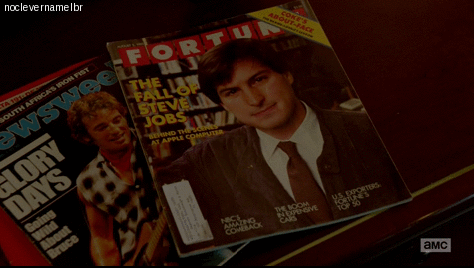There will be spoilers in everything that follows
Thirty years ago this week, Steve Jobs was pushed out of Apple through a series of reorganizations and board maneuvers. Yet one can’t think about that failure outside the context of his second act: Steve Jobs rising again. He spent time at Pixar, created NeXT, got brought and bought back by Apple, and put Apple on the path to being the most valuable company in the world, which it is today. That is one hell of a second chance story. That is a second-chance story that Halt and Catch Fire wishes it could tell. In fact, the season finale of Halt and Catch Fire alluded to Jobs’s Apple exit in a quick cut that was almost easy to miss:

Again, in the near-historical, alternate history of Halt and Catch Fire Apple—the most familiar of tech stories—plays the foil. The series used Apple last season when the introduction of the Macintosh stood in for innovation at a time when the central character Joe (Lee Pace) had just made the profit-driven decision to simply make the machine they were creating faster and cheaper. In contrast, the Macintosh “spoke.” Because Halt and Catch Fire must operate in this bizarre world of almost-real computing history, it nodded to the true history, although never quite hitting the same historical notes in the way that Mad Men could.
The parallels with Apple continue into the second season. Like Steve Jobs’s second act, Halt and Catch Fire Season 2 is a season of second (or third) chances. As it begins, the PC division of Cardiff Electric—the driver of the main story of Season 1— is sold off, making an ignominious end for something that took so many episodes to build. But, with that sale, every character is looking for their next chance.
Having flamed out at IBM and again at Cardiff (quite literally), the Joe is on his third chance when the season begins. He’s more relaxed, more authentic, with less product in his hair. His arc for the season is to see if he can be this authentic, honest person and also the successful visionary that he always been promised to be.
But he’s not the only one with vision. The central characters of the second season are actually Donna (Kerry Bishé) and Cameron (Mackenzie Davis), who struggle to build a company in the world of computers that are connected to phone lines. Apparently, this connected world is going to be big. Their arc is to make the company survive given Camerons no-selling-out ideals and turmoil in both of their personal lives.
And personal lives figure heavily throughout second season, a more conventionally dramatic season than the first. Season 2 has clandestine romances, an engagement, infidelity, a secret abortion, chronic mental diseases that cause amnesia, polyamory, a hate crime, and a marriage. Many critics I’ve read thought Season 2 was the better of the two, and, by conventional measures, they’re probably right. This is a more relationship-focused Halt and Catch Fire. It isn’t about building a company; it was about the people that made up the company.
Yet, missing from Season 2 are the business cases—the narratives about running a company. Yes, there are bad contracts that need to be renegotiated and employees that need to managed, but these were the background to the intense personal drama. Perhaps the narrative most similar to a business case was Cameron’s realization that more customers are interested in online communities than the online game playing she was so interested in creating. From listening to customers, she figures out that the focus of her company is wrong, and she needs to address it. In contemporary startup lingo, that would be the pivot.
Last year I argued that the business cases were a significant reason that Season 1 of Halt and Catch Fire was so interesting, and perhaps, it is the business case of the entrepreneur that so attracted the affluent viewers who made sure there was a Season 2. And, seen in that way, perhaps the most entrepreneurial point of this season is that second, third, and fourth chance. At the end of Season 2, Cameron and Donna are heading out to California as part of the second act of their online company Mutiny, while Joe has secured ten million dollars in funding for Macmillan Utilities, a virus utility company that is reminiscent of Norton Utilities and McAffe. Macmillan Utilities is the result of a virus that is mistakenly designed by his old partner, Gordon (Scoot McNairy)—who sought his own second chance to redeem himself from the slip-ip—and unleashed upon him by Cameron as revenge for a deal gone bad. And, because we live in 2015, we know that these second chances will pan out. As viewers, we know that online communities and computer antivirus will become huge. That’s the comforting thought that the series leaves us with: The next chance might be even bigger than this one. Like, maybe the next Apple.







